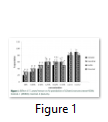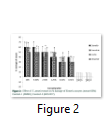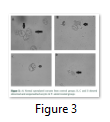Full Length Research Article
In vitro anticoccidial activity of Trachyspermum ammi (Ajwain) extract on oocysts of Eimeria species of Chicken
Asghar Abbas1, Rao Zahid Abbas*2, Muhammad Asif Raza1, Muhammad Kasib Khan2, Muhammad Kashif Saleemi3, Zohaib Saeed1
Adv. life sci., vol. 7, no. 1, pp. 44-47, November 2019
*- Corresponding Author: Rao Zahid Abbas (Email: raouaf@hotmail.com)
Authors' Affiliations
2. Department of Parasitology, Faculty of Veterinary Science, University of Agriculture, Faisalabad, Pakistan
3. Department of Pathology, Faculty of Veterinary Science, University of Agriculture, Faisalabad, Pakistan
Abstract![]()
Introduction
Methods
Results
Discussion
References
Abstract
Background: Due to development of synthetic anticoccidial drug resistance there is improvement of anticoccidial medicines due to which exploration of diverse therapeutic agents is attractive now a days. Amongst original agents’ miscellaneous botanicals have shown encouraging properties against coccidiosis. Present study is also a part of probing innovative therapeutic drugs against coccidiosis which can provide replacement solution to treat coccidiosis.
Methods: In current experiment in vitro anticoccidial effect of Trachyspermum ammi (seeds) extract was evaluated. For this purpose, an in vitro sporulation inhibition assay was used. Collected oocysts of four Eimeria species were exposed to six different concentrations (w/v) of T. ammi in 10% Dimethyl sulphoxide solution (DMSO), while Dimethyl sulphoxide and Potassium dichromate solution (K2Cr2O7) served as control groups.
Results: Results of study revealed that T. ammi extract showed in vitro anticoccidial effect by affecting on sporulation (%) and damaging (%) Eimeria oocysts in dose dependent manner. T. ammi extract also damaged the morphology of oocysts in terms of shape, size and number of sporocysts.
Conclusion: The results strongly support the botanicals applications of T. ammi extract and also demonstrate its potential for use in Poultry coccidiosis control strategies.
Keywords: Trachyspermum ammi extract; In vitro; Eimeria; Oocysts
In Pakistan, Poultry industry is expanding with very promising results and uplifting the socio-economic status of sectors related to this industry. However, the poultry production systems are facing serious constraints of infectious diseases as hindrance in getting desirable economic benefits [1,2]. Among all infectious diseases, parasitic diseases like coccidiosis cause serious threat to poultry industry. Coccidiosis is the most severe and devastating disease infecting gastrointestinal tract of chicken which is caused by Eimeria (protozoa) having various species [3]. Coccidiosis causes huge economic losses to poultry industry in different parts of world. Disease has various clinical features such as poor weight gain, high mortality and bloody feces [4,5]. Oocysts of Eimeria sporulate rapidly in soil having higher multiplication rate due to which its prevention is difficult once its outbreak has occurred at poultry farm. This disease is mostly controlled by using anticoccidial drugs but, their efficacy has been lowered in field due to resistance problems to these drugs and now it is not reliable and effective protocol for its control [6].
So, in matter of achieving success in controlling this severe disease other options and protocols are effectively used in different countries of world [7,8]. Among other options plant driven compounds and their products have shown better therapeutic effects against different parasitic [9], viral and bacterial diseases of poultry [10,11]. Botanicals such as Pinus radiata [4], Beta vulgaris [6], and Saccharum officinarum [9] are reported to have excellent anticoccidial and immunomodulatory activity against coccidiosis. Trachyspermum ammi commonly known as “Ajwain” has been traditionally used to treat many diseases which cause serious threat to human and animals [12]. Based on the various therapeutic effects of T. ammi, current experiment was conducted to check its in vitro anticoccidial activity against oocysts of Eimeria species of chicken.
Preparation of Trachyspermum ammi extract
T. ammi seeds were obtained from Faisalabad local market, authenticated by a botanist and aqueous methanol extract of seeds was prepared using Soxhlet apparatus (Velp Italy) following method as described previously [4]. Prepared T. ammi extract was stored at 4°C until further use.
Collection of Eimeria oocysts
Eimeria oocysts of four species were collected from the caeca of infected intestine which were collected from different poultry sale shops and reported cases in Faisalabad. Identification of oocysts of different Eimeria species was done on the basis of morphology of Eimeria oocysts and isolation site in the gastrointestinal tract of infected chickens. Collected oocysts were preserved and sporulated in potassium dichromate solution (2.5%) following the procedure as described previously [13].
Experimental design
In vitro efficacy of T. ammi extract was evaluated by sporulation inhibition assay. For this purpose, unsporulated oocysts of four Eimeria species (E. tenella, E. brunetti, E. necatrix and E. mitis) were subjected to different concentrations (w/v; 10, 5, 2.5, 1.25, 0.625 and 0.31%) of T. ammi in 10% DMSO in 5cm petri dishes by making two fold serial dilutions. DMSO and potassium dichromate solution (K2Cr2O7) served as control groups. Incubation of Eimeria oocysts was done for 48 hours at 27-29°C and 60% humidity. Three replications were made for each concentration. The sporulation process of Eimeria oocysts was checked under light microscope at 40x. Sporulation inhibition (SI) and damage of Eimeria oocysts was determined in percentage by following method as described previously [14].
Statistical analysis
Statistical analysis was done by ANOVA technique and significance among groups was determined at (P< 0.05).
Results of study showed that T. ammi extract significantly affected the sporulation process of Eimeria oocysts of different species as compared to both control groups (Control 1: DMSO, Control 2: Potassium dichromate solution (K2Cr2O7) (P< 0.05) as shown in Figure 1. T. ammi significantly reduced the sporulation of Eimeria oocysts, maximum sporulation reduction was observed in group treated with highest concentration of T. ammi extract (10%) followed by lower concentrations and the minimum sporulation reduction was observed in the group treated with lowest concentration of T. ammi extract (0.31%) which is suggestive of dose dependent sporulation inhibition activity of T. ammi extract against oocysts of all four Eimeria species.
T. ammi extract damaged morphology of Eimeria oocysts observed internally and externally as compared to both control groups (P< 0.05). Like that of sporulation inhibition activity of various concentrations of T. ammi extract, almost same trend was observed in terms of Eimeria oocysts damage. The detailed percent damage of oocysts caused by various concentrations of T. ammi extract is shown in Figure 2.
Figure 3A shows the normal sporulated oocysts containing four sporocysts. While Figures 3B, C & D show the unsporulated and damaged oocysts.
Figures & Tables
Plants have many antioxidant compounds such as flavonoids and phenols to which they bear diverse therapeutic effects [15,16]. Many botanicals and their products are reported to have excellent anticoccidial and therapeutic effects as proven by different in vitro and in vivo studies [17,18]. In present study like that of previous studies [9], in vitro anticoccidial effect of Trachyspermum ammi extract was measured in terms of sporulation inhibition and damage of Eimeria oocysts. The results showed that T. ammi stopped the sporulation processs and damaged the morphology of Eimeria oocysts in dose dependent manner. Such higher in vitro anticoccidial potential of T. ammi extract might be due to action of its antioxidant compounds of T. ammi against Eimeria. In addition, T. ammi extract also affected morphology of Eimeria oocysts in terms of abnormal shape of oocysts and sporocysts. Such higher in vitro anticoccidial potential of T. ammi extract might be due to action of its antioxidant compounds against Eimeria.
Almost similar in vitro effects of some botanical driven essential oils (thymol,carvacol, eugenol) on various Eimeria species have been reported previously and results of study concluded that essential oils caused significant reduction in sporulation rate of Eimeria oocysts was observed after exposure to botanical driven essential oils. There was in vitro inhibition and destruction of Eimeria oocysts by plants based essential oils [21].
In a recent study, in vitro anticoccidila effects of Psidium guajava (guava) extract were evaluated against Eimeria species of rabbits. Results of study revealed that Psidium guajava extract inhbited sporulation process of Eimeria oocysts and also effected the internal and external morphology of oocysts [22]. In another study in vitro anticoccidial effects of some herbal extracts have been reported against oocysts of Eimeria tenella. Among all tested extracts Curcuma longa exhibited highest inhibitory effects against sporulation of oocysts [23].
It was concluded from the results of study that T. ammi extract inhibited the sporulation process of Eimeria oocysts. T. ammi extract also damaged Eimeria oocysts. In vitro results of this study suggest to conduct further in vivo trials in formaulation of herbal drug from T. ammi extract for treating poultry coccidiosis.
Authors' Contribution
Asghar Abbas, Rao Zahid Abbas performed and collected data of experiment. Muhammad Asif Raza and Muhammad Kasib Khan assisted in execution of experiment. Muhammad Kashif Saleemi and Zohaib Saeed helped in statistical analysis and final proof reading of manuscript.
The authors declare that there is no conflict of interest regarding the publication of this paper.
Acknowledgement
All Authors acknowledge Punjab Agricultural Research Board (PARB Poject No.358 ) for financial assistance for this research work.
- Putri DD, Handharyani E, Soejoedono RD, Setiyono A, Mayasari NI, et al. 2018. Genotype characterization of Newcastle disease virus isolated from commercial chicken flocks in West Java, Indonesia. Pakistan Veterinary Jounal, (2018); 38: 184-188.
- Khan AU, Tipu MY, Shafee M, Khan NU, et al. 2018. In-ovo antiviral effect of Nigella sativa extract against Newcastle Disease Virus in experimentally infected chicken embryonated eggs. Pakistan Veterinary Jounal, (2018); 38: 434-437.
- Alzahrani F, Al-Shaebi EM, Dkhil MA, Al-Quraishy S. In vivo anti-Eimeria and in vitro anthelmintic activity of Ziziphusspina-christi leaf extracts fares. Pakistan Journal of Zoology, (2016); 48: 409-413.
- Abbas A, Iqbal Z, Abbas RZ, Khan MK, Khan JA. Immunomodulatory activity of Pinus radiata extract against coccidiosis in broiler chicken. Pakistan Veterinary Jounal, (2017); 37: 145-149.
- Blake DP, Tomley FM, Securing poultry production from the ever-present Eimeria challenge. Trends in Parasitology, (2014); 30: 12-19.
- Abbas A, Iqbal Z, Abbas RZ, Khan MK, Khan JA, et al. In vivo anticoccidial effects of Beta vulgaris (sugar beet) in broiler chickens, Microbial Pathogenesis, (2017); 111: 139-144.
- Doğan ANC, Çelik E, Kılıçle PA, Atalay E, et al. Antibacterial effect of hot peppers (Capsicum annuum, Capsicum annuum var globriusculum, Capsicum frutescens) on some Arcobacter, Campylobacter and Helicobacter species. Pakistan Veterinary Journal, (2018); 38: 266-270.
- Naseem MN, Saleemi MK, Abbas RZ, Khan A, Khatoon A, et al. Hematological and serum biochemical effects of aflatoxin B1 intoxication in broilers experimentally infected with fowl adenovirus-4 (FAdV-4). Pakistan Veterinary Jounal, (2018); 38: 209-213.
- Abbas A, Iqbal Z, Abbas RZ, Khan MK, Khan JA. In-vitro anticoccidial potentaial of Sacharrum officiarum extract against Eimeria Oocysts. Boletin latinoamericano y del caribe de plantas medicinales y aromaticas, (2015); 14: 456-46.
- Kiran K, Saleem F, Awan S, Ahmad S, Ahmad S, et al. Anti-inflammatory and anticancer activity of Pteris cretica whole plant extracts. Pakistan Veterinary Jounal, (2018); 38: 225-230.
- Tahir M, Rasheed MA, Niaz Q, Ashraf M, Anjum AA and Ahmed MU, 2017. Evaluation of antibacterial effect of Gymnema sylvestre R.Br. species cultivated in Pakistan. Pakistan Veterinary Jounal, (2017); 37: 245-250.
- Zarshenas MM, Moein M, Samani SM, Petramfar P, An Overview on Ajwain (Trachyspermum ammi) Pharmacological Effects; Modern and Traditional. Journal of Natural Remedies, (2014); 14: 99-105.
- Ryley JF, Meade R, burst JH, Robinson TE. Methods in coccidiosis research: Separation of oocysts from faeces. Parasitolology (1976); 73: 311-326.
- You MJ. Suppression of Eimeria tenella sporulation by disinfectants. Korean Journal of Parasitol, (2014); 52: 435–438.
- Zhang QH, Nie FH, Wang XN, Lin HY, Wang HCR et al. Effect of flavonoids from Eupatorium odoratum L. on immunoglobulins and cecal microflora in broilers. Pakistan Veterinary Jounal, (2018); 38: 296-300.
- Qureshi AS, Rehan S, Enbergs H, Nigella sativa seed extract affects granulocyte phagocytosis and lymphocytes proliferation in goats. Pakistan Veterinary Jounal, (2017); 37: 411-414.
- Zaman, M.A., Z. Iqbal, R.Z. Abbas RZ, Khan MN. Anticoccidial activity of herbal complex in broiler chickens challenged with Eimeria tenella. Parasitology, (2012); 139: 237-243.
- Majeed W, Khaliq T, Aslam B, Khan JA. 2018. Polyherbal formulation prevents hyperglycemia by modulating the biochemical parameters and upregulating the insulin signaling cascade in alloxan induced hyperglycemic rats. Pakistan Veterinary Jounal, (2018); 38: 121-126.
- Molan AL, Zhuojian L, S. De S. Effect of pine bark (Pinus radiata) extracts on sporulation of coccidian oocysts. Folia Parasitologica, (2009); 56: 1-5.
- Gadelhaq SM., Arafa WM, Abolhadid SM. In vitro activity of natural and chemical products on sporulation of Eimeria species oocysts of chickens. Veterinary Parasitolology (2018); 251: 12-16.
- Remmal A, Sanaa A, Latifa B, Fouzia C, Najat C. Oocysticidal effect of essential oil components against chicken Eimeria oocysts. International Journal of Veterinary Science and Medicine, (2013); 2: 133-139.
- Cedric Y, Payne VK, Nadia NAC, Kodjio N, Etung Kollins E, et al. In vitro anticoccidial, antioxidant activities and cytotoxicity of Psidium guajava extracts. Research Journal of Parasitology, (2018); 13: 1-13.
- Zaman MA, Iqbal, Z, Abbas RZ, Ehtisham-ul-Haque S, In vitro, efficacy of herbal extracts against Eimeria tenella. International Journal of Agriculture and Biology, (2015); 17: 848‒850.
This work is licensed under a Creative Commons Attribution-Non Commercial 4.0 International License. To read the copy of this license please visit: https://creativecommons.org/licenses/by-nc/4.0







